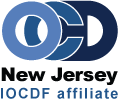OCDNJ September Quarterly Presentation
Dr. Michael Gotlib, Psy.D. Presented on
“Enhancing OCD Treatment By Increasing Psychological Flexibility”
by Rachel Strohl, Psy.D.
On Monday September 17, 2018, Michael Gotlib, Psy.D. presented at the quarterly meeting of OCD NJ at the Cherry Hill library. Dr. Gotlib joined the Center of Emotional Health in August 2016 after completing a postdoctoral fellowship at Princeton University Counseling and Psychological Services. Dr. Gotlib has an expertise in evidence based treatments including Cognitive Behavioral Therapy (CBT), Acceptance and Commitment Therapy (ACT), and Dialectical Behavior Therapy (DBT) for anxiety and mood disorders. He sees adolescents and adults for individual therapy in Cherry Hill and facilitates psychological skills workshops in Cherry Hill and Princeton. Dr. Gotlib provides counseling to students at Drexel University and is the group therapy coordinator at Drexel’s Counseling and Health Services. He is also a supervising psychologist at Drexel and is responsible for training and supervising doctoral trainees in clinical psychology.
Dr. Gotlib provided an overview of the Acceptance and Commitment Therapy (ACT) framework for OCD. He explained that while exposure and response prevention (ERP) is the main piece of OCD treatment, it can be a difficult treatment for some. The ACT framework views ERP as a process to increase psychological flexibility, which is our ability to recognize and adapt to various situations and shift both our mind and body towards the people and behaviors that are valued to us. Within an ACT framework, individuals increase their willingness to experience obsessions and anxiety in order to move toward their values.
According to Dr. Gotlib, the ACT framework helps people in having a kinder and more self-compassionate stance with their experiences, rather than being stuck in the obsessive and compulsive cycle. The ACT framework can allow more freedom to be flexible and focus less on the struggle within OCD and still engage in ERP.
The presentation was an interactive, experiential opportunity for audience members to practice various mindfulness and flexibility skills. This unique, hands-on experience is session one of the ACT workshop provided by Dr. Gotlib. He explained the ACT model on a graph: the “5-Senses Experience” (which is an outside experience) on top of the graph, the “Mental Experience” (which is an inside experience) on the bottom. In the center, audience members were instructed to “notice the difference.” On the left side, “moving away” and on the right side, “moving toward.”
The participants all received a binder clip and were instructed to close their eyes and use their five senses to experience the clip in their hands. Then, they were instructed to notice the five senses in their mental experience, inside their minds.
The group then worked together to offer suggestions to fill in the graph. Dr. Gotlib asked, “What shows up on the inside that keeps us away from what we value?” Under the “away” side consisted of the acronym TIMES: thoughts, images, memories, emotion, and sensations. Examples included “I’m too tired to do it, I’m not good enough, I will fail, etc.”
Above the “away” side consisted of the acronym DOTS: distraction, opting out, talking at, and substances. Examples included “walking away, avoid, sleep, eat, alcohol, gambling, yelling, etc.” Above the “toward” side consisted of the following instances: talk, play, cook, exercise, smile, live values, learn, go to the beach, and many more.
Dr. Gotlib explained that “the left side isn’t bad because we do towards and away, but we have one life to live. Where do you want to spend your time?” He asked to consider, “what’s the intention? You are the only one who knows what’s behind your actions.” He connected the ACT model to OCD and obsessions as internal experiences, as people with OCD try to get away from obsessions with compulsions. While traditional ERP is exposure to unwanted thoughts and feelings, ACT is mindfulness based in which one learns how to have a different relationship with thoughts and feelings.
The ACT matrix asks: 1) What gets in the way? 2) What do you want to move toward? 3) How do you change the relationship? In a verbal aikido handout, Dr. Gotlib outlined the following about a situation that each audience member selected: 1) What can I see and hear? 2) What hooks show up? 3) How do the hooks feel? Where in my body do they show up? 4) What away move could I be seen doing? 5) What toward move could I be seen doing? 6) Who/ what is important in this toward move? 7) How does who/what is important in this toward move feel? Where in my body does it show up?
This workshop offered an introduction to the ACT model in an accessible manner that can be applied to daily life. Participants gained insight into how trying to get away from discomfort can keep us stuck and move us away from living a meaningful and vital life with psychological flexibility.
DVDs of this presentation are available through the OCD NJ website.
Dr. Rachel Strohl is a licensed psychologist at Stress and Anxiety Services of NJ in East Brunswick. She is on the Board of Directors at OCD New Jersey. She may be reached at 732-390-6694.
